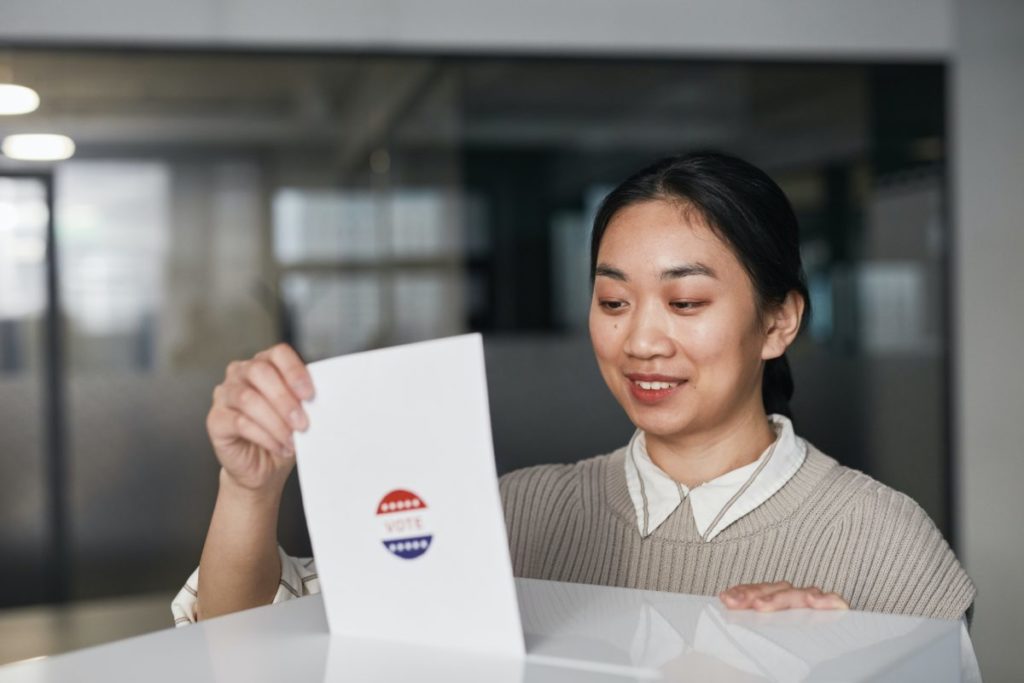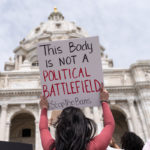
In the wake of the Supreme Court’s June ruling stripping away the constitutional right to abortion, an increasing number of young women are registering to vote, polling experts say.
The League of Women Voters has seen an uptick of interest in the Nov. 8 midterm elections, as many of the races will determine whether abortion remains legal in key states such as Arizona, Michigan, Pennsylvania and Wisconsin.
“Young women voters are really aware that their rights are on the ballot this year,” says Jeanette Senecal, the organization’s senior director of mission impact.
A new national study found that the right to abortion ranks as the top issue young people care about, followed by women’s rights, healthcare and the economy.
Abigail Louisin, a communications associate from Rock the Vote, has also witnessed an increase in interest in midterms. “We’ve seen outrage and calls to action online and offline amongst young people, especially as abortion bans and restrictions increased,” she says.
She and others anticipate record numbers of young women based on youth voting trends. Abortion policy affects young women primarily, as the majority of abortion patients are women in their 20s. And there are currently more women registered to vote than men. Within young voter groups, young women historically have a slightly higher turnout than men.
Young women are concerned about reproductive rights in general, but “specifically access to abortion and contraception,” says Senecal. In some states, she says “some of these issues are directly on the ballot through ballot measures.”
Gubernatorial and attorney general candidates in a number of states are building their campaigns around abortion rights. For example, Wisconsin’s attorney general election race features a face-off between Eric Tony, who says he will enforce the state’s 1849 abortion ban if elected, and incumbent Josh Kaul, who says he will not enforce it.
Among adults under age 30, 74% believe abortion should be legal in all or most cases. In elections such as the one in Wisconsin, where abortion’s legality is on the line, a surge in voter registrations hints at a surge in ballots cast.
This would not be the first time polls have seen an uptick in young women voters. Between 2014 and 2018, the turnout of young women voters increased dramatically — and in many key states, voter registration rates are currently surpassing what they were in 2018, according to Louisin.
“All signs point to another year of record-breaking youth voter turnout,” she says.
Professor Anna Kirkland, who specializes in women’s and gender studies at the University of Michigan, says the increase of voters between 2014 and 2018 is already beneficial for the upcoming midterms, because now these voters are in voter information databases and campaign staff can track them by phone and mail. However, it will still be a challenge to market to first-time voters because they are “harder to find.”
Kirkland, who studies the relationships between health, law and rights in the U.S., is teaching nine students this year, all women. She says they are all concerned about the Dobbs v. Jackson Women’s Health Organization decision and attended listening sessions over the summer about reproductive rights. Although data has shown that public discourse about the Dobbs decision has subsided since then, she does not think young women are going to forget about it.
“It’s a very pro-choice generation,” she says. “And then there’s also climate, student loans, housing prices, rent increases — all those things hit this group really hard.”
Senecal adds that young women are also driven by racial justice issues, “whether that’s gun violence, policing issues or economic issues,” which carry over into other areas. “There’s climate justice — that has a racial impact. Our youngest population is the most diverse. They have grown up in a time when political activism is on the rise.”
Data from CIRCLE also shows that in 2020, young Asian women, young Black women, and young Latinas were more likely to talk politics and participate in elections, and turned out to vote at a rate of more than 10% higher than their male counterparts.
Kirkland attributes the rising political awareness to the dramatic polarization that younger generations have grown up with.
“It’s really vivid to them,” she says. “Climate change is becoming more obvious to a lot of voters, since they’ve been coming of age politically in a way that it didn’t happen with previous generations. So they see all those things — the polarization, school shootings, climate — becoming more problematic.”
Senecal has also seen an increase in women helping other women register to vote and directing them to resources. She says there have been more women leaders in the voting space as well.
Younger women especially are credited with leading marches and protests all over the country following the Dobbs decision, whether they are in support of or against abortion rights.
“As the midterm elections determine who state and local leaders will be, there seems to be a palpable sense of deep concern,” says Louisin. “Young people — young women — want to see elected officials make decisions that reflect their values and most pressing concerns. As reproductive justice issues affect all of us, regardless of gender identity, it’s our hope that young voters make their voices heard in this election.”
Senecal has been advising young women to make an election plan early, especially college students who may need to request ballots by mail.
“I believe young women voters really see this as an opportunity to shape not just their communities but also our country,” she says.


